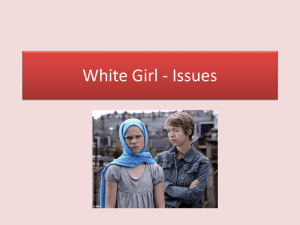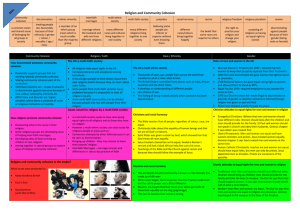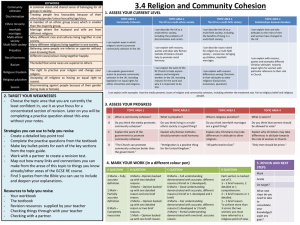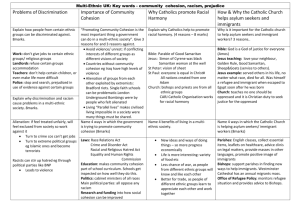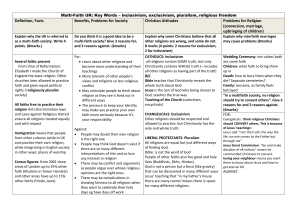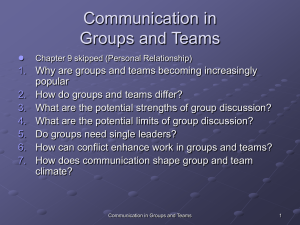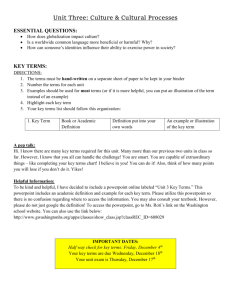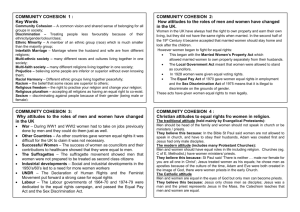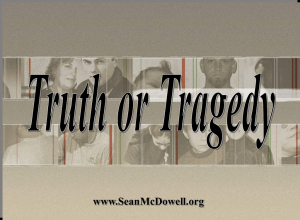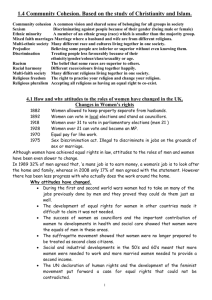Religion and community cohesion
advertisement
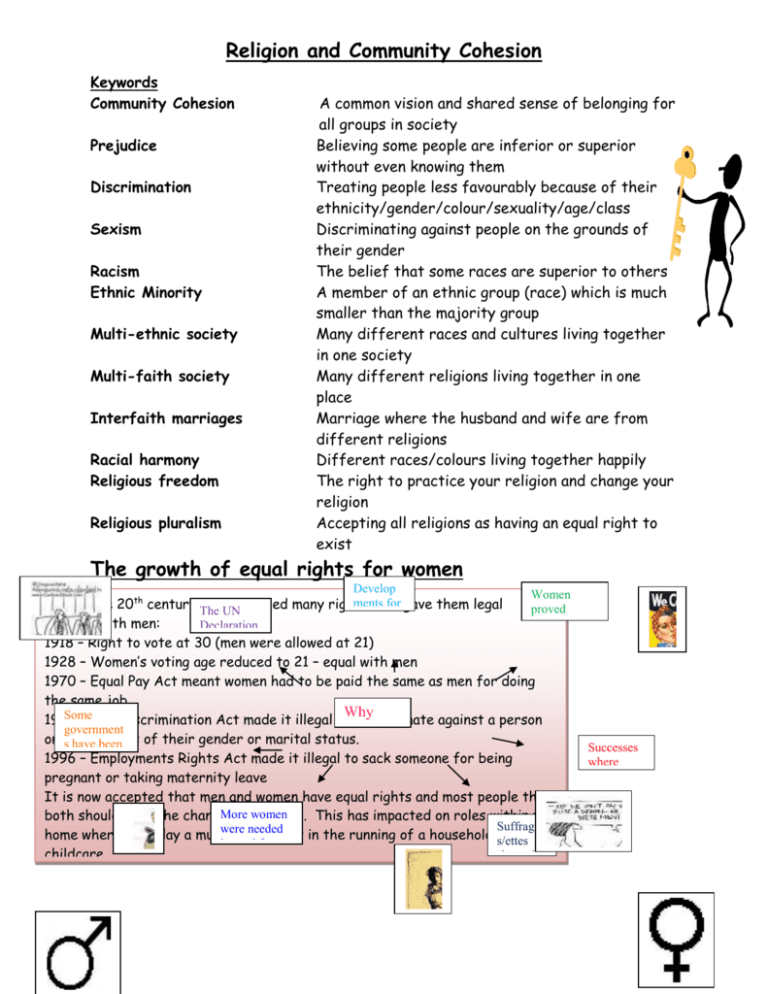
Religion and Community Cohesion Keywords Community Cohesion Prejudice Discrimination Sexism Racism Ethnic Minority Multi-ethnic society Multi-faith society Interfaith marriages Racial harmony Religious freedom Religious pluralism A common vision and shared sense of belonging for all groups in society Believing some people are inferior or superior without even knowing them Treating people less favourably because of their ethnicity/gender/colour/sexuality/age/class Discriminating against people on the grounds of their gender The belief that some races are superior to others A member of an ethnic group (race) which is much smaller than the majority group Many different races and cultures living together in one society Many different religions living together in one place Marriage where the husband and wife are from different religions Different races/colours living together happily The right to practice your religion and change your religion Accepting all religions as having an equal right to exist The growth of equal rights for women Develop Women ments for During the 20th century The women proved UN gained many rights that gave them legal equal themselves equality with men: Declaration rights in the of Human 1918 – Right to vote at 30 (men were allowed at abroad, 21) workplace Rights egwith Newmen 1928 – Women’s voting age reduced to 21 – equal during the states Zealand 1970 – Equal Pay Act meant women women are had to be paid the same as men for doingWars equal to the same job men Why Some 1975 – Sex Discrimination Act made it illegal to discriminate against a person government have on the grounds of their gender or marital status. s have been attitudes Successes committed 1996 – Employments Rights Act made it illegal changed? to sack someone for being where to equality women pregnant or taking maternity leave and so were It is now accepted that men and women have equal rights and most people think introduced allowed to legislation both should have the chanceMore of awomen career. This has impacted on roles within the play an Suffragist were needed to help equal role home where men play a much larger part in the running of a household s/ettes and in workforce provide it childcare. showed and more homes needed second income men women were prepared to fight for rights Christian attitudes towards the role of men and women WHO WHAT WHY Many evangelical Many protestants, e.g. C of E Protestants and Methodists believe men and believe that men and women women have different have equal roles in life and roles. Men should be religion and they can be the head of the priests family and women should not speak in church or be priests. St Paul said women could not speak in church Genesis said Adam was created first All of Jesus’ followers were male The Catholic Church believes that men and women should have equal roles because men and women have equal status in the eyes of God. Women can be religious teachers and ministers but cannot be priests. Genesis 1 said men and women Genesis 1 say that men and were created at the same time women were created at the St Paul said men and women same time are equal The church teaches that Jesus treated men and men and women are equal women equally and he did have Jesus only choose men to be women followers his successors Jesus women followers were Jesus was a man and the the only people to stay with priest represents Jesus at him for his crucifixion and the Mass. women were the first ones to see him when he rose from the dead The UK as a multi-ethnic society Britain has always been a multi-ethnic society, being a mixture of Celts, Romans, Angles, Saxons, Danes, Normans etc. It has always had a history of providing sanctuary to those suffering persecution, such as French Less chance of war Protestants and Russian Jews. During the 19th Century the UK built the British Empire around the world. This became the Commonwealth after the Second World War. After the war a shortage of workers led to a big increase in immigration from people of many different races from around the Commonwealth. Afro-Caribbeans, Indians, Pakistanis, Chinese and Bangladeshis settled in the UK, many of More progress as Life is more interesting with a much greater variety of food, music, fashions and entertainment Less chance of war as people of different races and nationalities will get to know and like each other Benefi ts of a Multi-ethnic societies tend to progress quickly because new people bring in new ideas and new ways of doing things Racially prejudiced employers will not give jobs to certain ethnic groups, religiously prejudiced will not give jobs to certain religious groups. Prejudiced landlords are likely to refuse accommodatio n to certain ethnic groups or religions Help people to see that everyone is part of the human race and we have more similarities than differences, vital in an increasingly small world If teachers are prejudiced they might discriminate against ethnic or religious groups in their teaching so students don’t achieve what they are capable of Proble ms of Prejudiced police officers might discriminate against ethnic Effects of discrimination and racism: If certain groups are treated unfairly they can feel alienated by society. They might start to work against that society Some politicians believe young black people feel they will be unable to get a good job because of racism and so they turn to crime as it is the best way for them to ‘earn’ good money. If true racism might lead to an increase in crime Some politicians believe discrimination against Islam leads young Muslims to supporting extremist Islamic groups because they have no chance of succeeding in Britain. This can lead to committing acts of terrorism Racism and discrimination can lead to the rise in groups like the BNP who stir up hatred, this can lead to violence and communal warfare Promoting Community Cohesion If a multi-ethnic society is to function well, all people must be treated equally and helped to do their best. If people are prejudiced against ethnic groups, this will not happen and society will lose out if people are not allowed to reach their full potential. The UK promotes community cohesion in a number of ways: 1. Encouragement – Making racial harmony part of the school curriculum, financially Community cohesion is important for all multi-ethnic and multi-faith communities: Without it different groups in society could have different ideas of what society should look like, could lead to violence and civil unrest. Lack of community cohesion led to racially/religiously motivated street riots in Britain in 2001 The July 7th 2007 bombers were British Muslims who had lost their sense of allegiance to Britain In countries without community cohesion violence becomes a way of life Lack of community cohesion leads to communities living separate lives, self-segregating Christianity and racial harmony The Christian church has members from every race. Over 50% of the world is Christian and 70% of Christians are non-white. Christians should try and promote racial harmony because: Jesus treated people of different races equally, a Samaritan woman, a Roman servant and a Black African carried his cross In the parable of the good Samaritan Jesus showed that races who hated each other should love each other as neighbours St Peter had a vision from god, telling him that god has no favourites among the races St Paul said that all races are equal in Christ and so there should be no divisions of race among Christians. He also taught all humans are descended fom Adam and therefore everyone is equal God created all races in his image All the Christians churches have made statements condemning racism All Christian churches have ministers/ priest of different colours Britain as a multi-faith society For hundreds of years Britain was a predominantly Protestant Christian country and discriminated against other religious groups, especially Catholics. However Britain has had believers from different faiths for years, Protestants and Catholics from the 16th Century, Jews from the 17th Century. This led to laws allowing religious freedom and by the middle of the 19th Century members of any religion were free to worship and had equal political rights: 1688 Nonconformists given freedom of Hounslow : 110, 657 Christian s 16,064 Hindus Increases tolerance 19,378 and understanding Muslims 18,265 Sikhs Brad ford: 16% Musli m 1.1% Sikh 0.9% Hind u Benefi ts of a Allows believers to explore their own beliefs Birmin gham: 14.4% Muslim 2.9% Sikh 2% Hindu 0.3% Buddhi st 0.24% Jewish 2001 Census: Christians - 72.6% No religion – 14% No answer – 8.2% Muslims – 2.7% Hindus Allows insight into– 0.95% different religions Sikhs – 0.57% Jews – 0.46% Buddhists – 0.25% Other – 0.27% Religious freedom reduces religious conflict Conversion My way’s right – you should join me!!!! Bringing up children Issues raised Mixed faith marriages Conversion This is an issue because teachings of religions can conflict with multi-faith societies: 1 – Many groups within religions, including Christianity and Islam can believe in exclusivists. They see it as a duty to try and convert others to their religion: Their religion is the only true religion, all others are mistaken Everyone should go to heaven and only their religion can get you there Holy books state that they should try and convert non-believers 2 – Trying to convert others can be a problem because: This can be seen as prejudice and discrimination, someone believing their faith is superior Most people trying to convert others do not have in depth knowledge of other religions and so cannot say for definite their way is right It can lead to arguments and even violence if people are told their faith is wrong Bringing up children Multi-faith societies require all to have religious freedom, including children. When they can think for themselves they should be able to choose which religion to follow or to reject religion. They also need to be able to learn about other faiths and respect the faiths of others. This can cause problems for believers: Most religions encourage parents to bring their children up in that faith, many of these parents do not want their child to have the ability to choose another religion or to reject religion Some parents will worry that their children will not go to heaven/paradise if they turn away from their faith Social and peer pressures mean parents exert pressure on children to uphold family religious tradition Children in state schools experience secular life and can be tempted away from religious lifestyles Interfaith Marriages Young people of different faiths will meet and fall in love. This can cause issues for religious parents and religious leaders. Often no religious wedding ceremony as both couples need to be of the same faith to have a religious ceremony Which religion should a child be brought up in? What will happen after death? Will the couple be buried separately according to their religions? Can cause feelings of betrayal for parents and relatives, someone has abandoned their roots and family for love How do religions work to promote community cohesion? Encouraging greater education regarding other faiths to help deal with issue of upbringing of children Religious leaders are working together to find and promote the similarities between their beliefs rather than differences Prom oting com munit y cohes ion Religious leaders working together to support interfaith marriages Putting together special groups to explore ways of increasing community cohesion How one issue from religion and community cohesion has been presented in one form of the media You need to be able to discuss how one issue from Religion and Community Cohesion has been covered in one form of the media: Equality for women in religion Problems of discrimination or racism Equal rights for ethnic minorities Equal rights for religious minorities Religion and racial harmony Issues within multi-faith societies Religions promoting community cohesion You must be able to discuss: Why the issue is important How it is presented Whether the presentation was fair to religious beliefs Whether the presentation was fair to religious people It is important that you choose only one issue within one form of media. If you discuss more than one issue your answers may get muddled. You are unlikely to be asked an evaluation question on this topic but you may come across b or c questions: b) Do you think the media present religious people fairly? (4) Give two reasons for your point of view c) Choose an issue from religion and community cohesion presented in one form of the media and explain whether the presentation was fair to religious people. (8) Media could mean: Film Soap opera A television drama A television documentary A radio programme A newspaper article in tabloids and broadsheets Test Yourself!!! (a) What is religious pluralism? (2) (b) Do you think children should be free to choose their own religion? (4) Give two reasons for your point of view. (c) Explain why Christians should help to promote racial harmony (8) (d) ‘Men and women should have equal roles in life’ i. Do you agree? Give reasons for your opinion (3) ii. Give reasons why some people may disagree with you (3) (Total 20 marks) (a) What is prejudice? (2) (b) Do you think the government should spend money promoting community cohesion? Give two reasons for your point of view. (4) (c) Choose one religion other than Christianity and explain why there are different attitudes to the role of women in religion (8) (d) ‘All societies should be multi-faith societies.’ i. Do you agree? Give reasons for your opinion (3) ii. Give reasons why some people may disagree with you (3) (Total 20 marks) Tip It might be useful to try and answer questions in timed condition and later go back and improve your answers using your notes and the mark scheme
